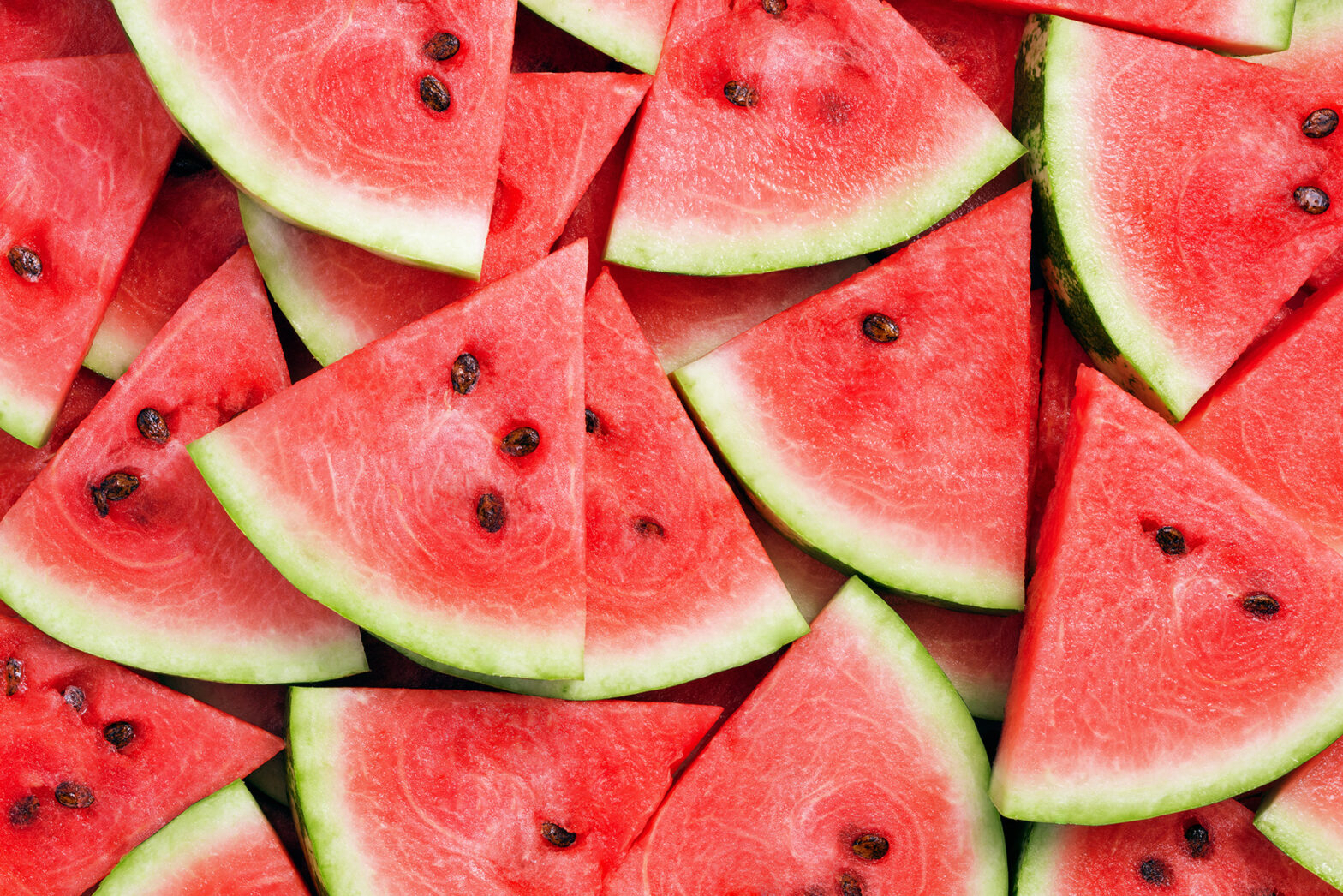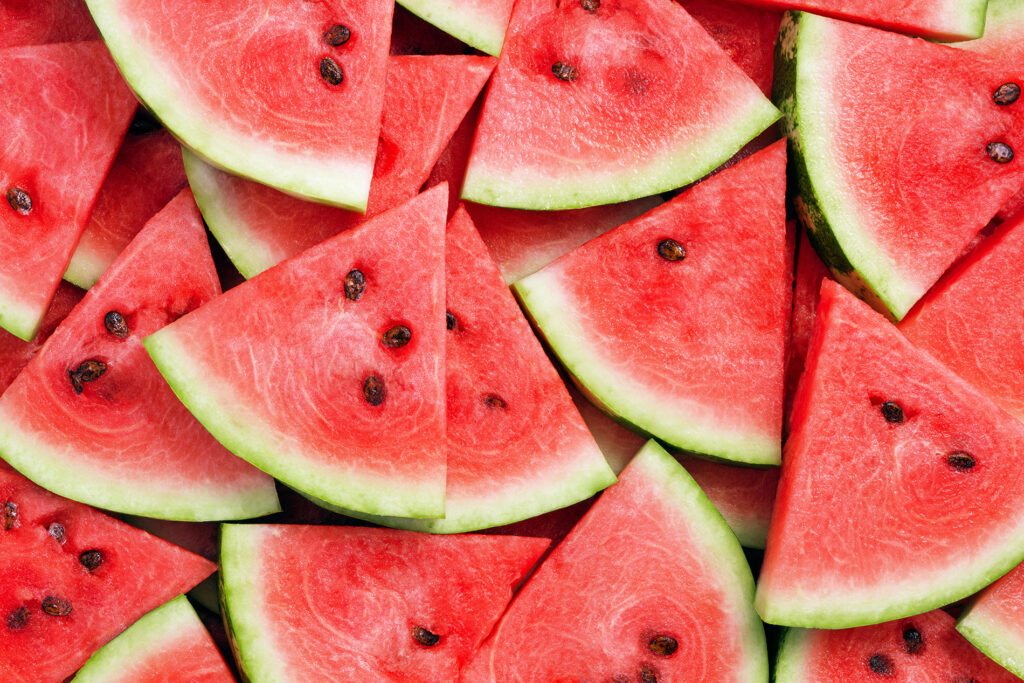Watermelon is a wonder, and you may surprise yourself to find out that it is also a nutrient-packed therapeutic resource. My mother used to say it was like breastmilk for adults, and it may very well be. Watermelon is a fruit that contains many nutrients, including protein, vitamins, minerals, and antioxidants, not unlike breast milk. Let’s take a closer look at the wonder of watermelon.
1. Hydration Therapy
Watermelon is like a refreshing oasis in the desert of thirst. Composed of a whopping 91% water, it quenches your thirst and keeps you hydrated. Whether you’re lounging by the pool or sweating it out at the gym, watermelon has your back.
2. Lycopene Leader
Watermelon contains lycopene and other antioxidant-rich phytonutrients. Watermelon has more lycopene than any other fresh fruit or vegetable. Lycopene is an antioxidant that gives watermelon its vibrant red hue. It’s linked to reduced cancer risk, heart health, and even age-related eye disorders. With 12.7 mg of lycopene per 2-cup serving, watermelon proudly wears the “Lycopene Leader” crown.
3. Vitamins Rich
Vitamin C: This essential antioxidant boosts your immune system and keeps your skin glowing.
Vitamin A: Watermelon contains beta carotene, which your body converts into vitamin A. Hello, healthy vision and radiant skin!
Vitamin B5 (Pantothenic Acid): Found in almost all foods, this vitamin plays a role in energy metabolism and overall well-being.
Copper: Often lacking in Western diets, copper is abundant in watermelon and supports various bodily functions.
4. Magnesium Supplement
Watermelon whispers secrets of magnesium—a mineral that plays a vital role in muscle function, nerve transmission, and bone health. Sip that watermelon smoothie and let magnesium work its magic.
5. Potassium Power
Your heart loves watermelon! It’s a decent source of potassium, which helps regulate blood pressure and keeps your ticker happy. Potassium is an electrolyte that helps regulate muscle and nerve activity.
6. Digestive Fiber
While watermelon isn’t a fiber heavyweight, its 0.6 grams of fiber per cup still aids digestion and supports gut health. Plus, it’s gentle on your tummy.
7. Low-Calorie Satisfaction
At just 46 calories per one-cup serving, watermelon is the guilt-free treat you’ve been craving. Say goodbye to calorie counting and hello to sweet satisfaction.
8. Protein Included
While watermelon isn’t exactly a protein powerhouse, it still brings a touch of protein magic to the picnic. 1 cup (152 grams) of raw, diced watermelon contains 0.9 grams of protein. It’s not a steak, but hey, every little bit counts.
9. Antioxidant Symphony
Beyond lycopene, watermelon hosts a symphony of antioxidants. Vitamin C, that immune-boosting rockstar, dances alongside beta carotene (the precursor to vitamin A). Together, they fend off free radicals and keep your cells humming with joy.
10. Collagen Connection
Watermelon’s vitamin C isn’t just for show. It’s a backstage VIP pass to collagen production. Collagen keeps your skin supple, your joints happy, and your hair fabulous. So, watermelon isn’t just a snack; it’s a beauty elixir!
Watermelon also contains citrulline, an amino acid that may help improve exercise performance. Watermelon seeds contain healthy fats, zinc, and iron.
So, next time you sink your teeth into a juicy slice of watermelon, savor its sweetness and impressive health benefits. Stay hydrated, stay healthy, and let watermelon be your summertime superhero!
Watermelon Therapeutic Recipes
Let’s dive into the refreshing waters of watermelon wisdom. Here are some practical how-to formulations for various treatments and therapies using this juicy fruit:
1. Watermelon Skin Paste
Ingredients:
- Fresh watermelon pulp (about 1 cup)
- Aloe vera gel (2 tablespoons)
- Honey (1 tablespoon)
Instructions:
- Blend the watermelon pulp until smooth.
- Mix in the aloe vera gel and honey to create a paste.
- Apply the paste to your skin (especially sunburned areas).
- Leave it on for 15–20 minutes.
- Rinse off with cool water.
- Enjoy the soothing, hydrating effect!
2. Watermelon Heat Exhaustion Elixir
Ingredients:
- Fresh watermelon juice (2 cups)
- Coconut water (1 cup)
- A pinch of sea salt
- Fresh mint leaves (optional)
Instructions:
- Combine the watermelon juice and coconut water.
- Add a pinch of sea salt for electrolyte balance.
- Chill the mixture.
- Sip slowly to rehydrate and cool down during hot weather or after physical exertion.
- Garnish with mint leaves for extra freshness.
3. Watermelon Face Toner
Ingredients
- Fresh watermelon juice (½ cup)
- Witch hazel (½ cup)
Instructions:
- Mix the watermelon juice and witch hazel.
- Transfer to a clean bottle.
- Apply the toner to your face using a cotton pad after cleansing.
- It refreshes your skin and minimizes pores.
4. Watermelon Foot Soak
Ingredients:
- Watermelon rind (peeled and chopped)
- Warm water (enough to cover your feet)
Instructions:
- Place the watermelon rind in a basin.
- Pour warm water over it.
- Soak your feet for 15–20 minutes.
The natural acids in the rind help soften and exfoliate your skin.
5. Watermelon Facial Mist
Ingredients:
- Fresh watermelon juice (½ cup)
- Rose water (½ cup)
- Aloe vera gel (1 tablespoon)
Instructions:
- Mix the watermelon juice, rose water, and aloe vera gel.
- Pour the mixture into a spray bottle.
- Spritz it on your face for an instant refreshing boost.
- Perfect for hot days or as a midday pick-me-up!
6. Watermelon Hair Rinse
Ingredients:
- Fresh watermelon juice (1 cup)
- Apple cider vinegar (2 tablespoons)
Instructions:
- Mix the watermelon juice and apple cider vinegar.
- After shampooing, pour the mixture over your hair.
- Massage it into your scalp.
- Leave it on for a few minutes.
- Rinse thoroughly with water.
- Your hair will thank you for the extra shine and hydration!
7. Watermelon Smoothie for Radiant Skin
Ingredients:
- Fresh watermelon chunks (1 cup)
- Greek yogurt (½ cup)
- Chia seeds (1 tablespoon)
- Fresh mint leaves (for garnish)
Instructions:
- Blend the watermelon chunks and Greek yogurt until smooth.
- Add chia seeds and mix well.
- Pour into a glass and garnish with mint leaves.
- Sip your way to glowing skin and happy taste buds!
8. Watermelon Ice Cubes
Ingredients:
- Fresh watermelon juice (from half a watermelon)
- Ice cube tray
Instructions:
- Pour the watermelon juice into an ice cube tray.
- Freeze until solid.
- Pop these vibrant ice cubes into your water or summer drinks.
- Hydrate with a splash of color!
9. Watermelon Salad Dressing
Ingredients:
- Fresh watermelon juice (¼ cup)
- Olive oil (2 tablespoons)
- Lemon juice (1 tablespoon)
- Salt and pepper (to taste)
Instructions:
- Whisk together the watermelon juice, olive oil, and lemon juice.
- Season with salt and pepper.
- Drizzle over your favorite salad for a fruity twist.
10. Watermelon Sorbet
Ingredients:
- Fresh watermelon chunks (4 cups)
- Lime juice (from 2 limes)
- Honey (2 tablespoons, adjust to taste)
Instructions:
- Blend the watermelon chunks until smooth.
- Add lime juice and honey. Blend again.
- Pour the mixture into a shallow dish.
- Freeze for a few hours, stirring occasionally.
- Scoop out the sorbet and enjoy guilt-free sweetness!
Watermelon isn’t just a fruit—it’s a versatile canvas for creativity. Whether you’re pampering your skin or indulging your taste buds, let watermelon be your delightful companion and add a splash of health and joy to your life!
Watermelon and Breast Milk
My mother used to say that watermelon was breast milk for adults and would use it to make headaches disappear.
While there isn’t a direct scientific correlation between watermelon and breast milk, let’s explore some aspects related to both:
Hydration and Milk Supply
Watermelon is mainly composed of water. Mild dehydration can lead to a low milk supply in breastfeeding mothers. Consuming water-rich fruits like watermelon can help maintain consistent breast milk production.
Breast milk composition is influenced by the mother’s diet, but the body prioritizes nutrients essential for the baby’s growth and development.
Nutrient Content
Like breast milk, watermelon is incredibly hydrating due to its high water content. Staying well-hydrated is essential for overall health.
Watermelon also provides vitamins (such as vitamin C) and antioxidants, contributing to well-being.
Breast milk, on the other hand, contains a unique blend of nutrients tailored to meet the baby’s specific needs.
Trace Elements
Watermelon contains trace elements that could affect breastfed babies. Monitoring watermelon intake is important to avoid any adverse effects.
While watermelon isn’t exactly like breast milk for adults, there are a few interesting points to consider:
Nutrients
.
Citrulline Connection:
Watermelon contains an amino acid called citrulline. Citrulline is involved in various physiological processes, including blood flow and immune function.
Some studies suggest that citrulline might have benefits for cardiovascular health and exercise performance.
Digestive Comfort
Watermelon’s gentle fiber content can aid digestion, similar to how breast milk provides easily digestible nutrients for infants.
Remember, while watermelon isn’t a direct substitute for breast milk, it’s a refreshing and nutritious addition to your diet. Enjoy those juicy slices!
However, the trace elements in watermelon are unlikely to mimic breast milk directly.
While watermelon is hydrating and nutritious, it doesn’t replace breast milk. Breastfeeding moms should focus on a balanced diet, including various foods, to support both their health and their baby’s well-being, but maybe watermelon could be considered.
Watermelon for Headaches
Watermelon is a refreshing and hydrating fruit, but it can have varying effects on individuals. Here’s what we know:
Watermelon May Trigger Migraine
A recent study suggests that watermelon may trigger migraines in some people, particularly those who frequently suffer from them. Researchers say that those who are sensitive to nitrites, like those found in watermelon, may cause headaches.
Nitrites are also present in other foods like deli meats, hot dogs, and cured meats, which are also linked to migraines.
Hydration and Headaches
Watermelon’s high water content (92%) makes it an excellent choice for hydration.
Dehydration can lead to fatigue, muscle cramps, and headaches, so staying hydrated with watermelon can help.
Moderation and Individual Variability
While watermelon can be beneficial, consuming it in moderation is essential.
Everyone’s tolerance to foods varies, so if you notice any adverse effects, consider adjusting your intake.
Remember, individual food responses can differ, so pay attention to how your body reacts. If you experience headaches, consult a natural healthcare professional for personalized advice.

